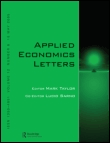
APPLIED ECONOMICS LETTERS
Scope & Guideline
Innovating insights for today's economic landscape.
Introduction
Aims and Scopes
- Empirical Analysis of Economic Policies:
The journal emphasizes empirical studies that evaluate the impact of various economic policies on market outcomes, firm behavior, and consumer welfare, particularly in response to economic shocks. - Sectoral and Regional Economic Studies:
Research often explores specific sectors or regions, providing insights into localized economic dynamics and their broader implications for national and global economies. - Interdisciplinary Approaches:
APPLIED ECONOMICS LETTERS encourages interdisciplinary research that incorporates perspectives from finance, sociology, and environmental studies, especially in the context of economic development and sustainability. - Behavioral Economics and Decision-Making:
The journal includes studies on behavioral economics, focusing on how psychological factors influence economic decision-making among individuals and organizations. - Financial Markets and Institutional Analysis:
There is a consistent focus on the functioning of financial markets, the role of institutions, and their impact on economic stability and growth. - Innovation and Technological Change:
Research on the effects of innovation, digital transformation, and technology adoption on economic performance and firm competitiveness is a core area of interest.
Trending and Emerging
- Impact of Digital Finance and Technology:
Research on digital finance, including cryptocurrency and fintech, is trending as scholars examine their implications for traditional banking, investment behaviors, and economic stability. - Environmental Economics and Sustainability:
There is a growing focus on the relationship between economic activities and environmental sustainability, particularly in the context of climate change and green finance initiatives. - Behavioral Insights in Economic Decision-Making:
The integration of behavioral economics into traditional economic analyses is gaining momentum, reflecting an increased interest in understanding how cognitive biases affect economic outcomes. - Health Economics in the Context of Pandemics:
Studies exploring the economic impacts of public health crises, particularly COVID-19, are prevalent, analyzing their effects on labor markets, consumer behavior, and economic policy. - Policy Responses to Economic Shocks:
Research focusing on the effectiveness of policy measures in response to economic shocks, such as fiscal stimulus during economic downturns, is increasingly prominent. - Global Value Chains and Trade Dynamics:
Emerging research examines the complexities of global value chains, particularly in light of geopolitical tensions and the COVID-19 pandemic, highlighting their impact on trade flows and economic resilience.
Declining or Waning
- Traditional Labor Market Studies:
Research focusing solely on traditional labor market dynamics, such as wage determination and employment statistics, has declined as newer frameworks incorporating technology and digitalization gain traction. - Static Economic Models:
There is a waning interest in static economic models that do not account for dynamic changes in markets or behaviors, as researchers increasingly favor models that incorporate time-varying factors. - Localized Case Studies without Broader Implications:
While localized studies remain important, those that do not connect findings to broader economic theories or policy implications have seen a reduction in publication frequency. - Macroeconomic Indicators without Contextual Analysis:
Publications focusing on macroeconomic indicators in isolation, without exploring the underlying causes or contextual factors, have diminished as the journal emphasizes more integrated analyses. - Consumer Behavior Research in Isolation:
Research on consumer behavior that does not link to broader economic or policy implications has become less common, as the focus shifts towards understanding interconnected economic systems.
Similar Journals

Annals of Economics and Finance
Bridging Theory and Practice in Economic Research.Annals of Economics and Finance is an esteemed academic journal published by Wuhan University Journals Press, focusing on the fields of Economics and Finance. Established in 2000, this journal serves as a platform for scholars to disseminate their research findings and insights, contributing to the development of these disciplines through rigorous peer-reviewed articles. Despite currently holding a Q4 ranking in both Economics and Econometrics and Finance categories (2023), it strives to enhance its impact on the academic community and policy-making audiences. While not Open Access, the journal seeks to cultivate a deeper understanding of vital economic theories and financial practices, thereby offering invaluable resources for researchers, professionals, and students alike. With its broad scope, the Annals of Economics and Finance is poised to play a crucial role in shaping contemporary economic discourse up to 2024 and beyond.
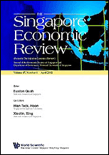
SINGAPORE ECONOMIC REVIEW
Illuminating the evolving dynamics of the global economy.SINGAPORE ECONOMIC REVIEW, published by WORLD SCIENTIFIC PUBL CO PTE LTD, stands as a prominent platform for research in the fields of economics and econometrics since its inception in 1983. With an ISSN of 0217-5908 and an E-ISSN of 1793-6837, this journal caters to a diverse audience by presenting high-quality, rigorously reviewed articles that address pressing economic issues both in Singapore and globally. Currently classified in the Q3 category for Economics and Econometrics for 2023, it ranks #265 out of 716 in Scopus, placing it in the 63rd percentile among economic journals. Although not open access, the articles published here contribute valuable insights into the evolving dynamics of economic theory and practice, making it an essential resource for researchers, educators, and policymakers alike. The journal's commitment to advancing economic research continues to foster dialogue and inspire innovative approaches within the academic community.
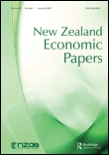
New Zealand Economic Papers
Illuminating economic pathways for researchers and policymakers alike.New Zealand Economic Papers is a prominent academic journal dedicated to the field of economics, published by Taylor & Francis Ltd. With its ISSN 0077-9954 and E-ISSN 1943-4863, this journal has been a significant contributor to economic discourse since its inception in 1966, continuing to provide valuable insights through to 2024. As part of the third quartile (Q3) in the Economics, Econometrics and Finance category, it ranks at #165 out of 288 in Scopus, placing it within the 42nd percentile, demonstrating its respectable impact in the academic community. Although the journal does not offer open access, it remains a vital resource for researchers, professionals, and students interested in understanding economic dynamics, policy analysis, and applied econometrics, particularly in the context of New Zealand. The journal's commitment to rigorous research ensures that it continues to play a crucial role in shaping economic policy and academic thought across the globe.

Empirical Economics
Unveiling groundbreaking research in empirical economics.Empirical Economics, published by PHYSICA-VERLAG GMBH & CO in Germany, is an esteemed journal in the field of economics that has been disseminating high-quality research since its inception in 1976. With an impressive convergence of studies that extends to 2024, the journal occupies notable positions within various academic categories, achieving a Q2 ranking in Economics and Econometrics and Statistics and Probability, and a commendable Q1 ranking in Mathematics (miscellaneous) and Social Sciences (miscellaneous) as of 2023. The journal stands out for its interdisciplinary approach, evidenced by its Scopus ranks that place it in the top percentiles across multiple sections, including the 86th percentile in both Mathematics and Social Sciences rankings. While currently not an open access journal, Empirical Economics serves as a pivotal platform for researchers, professionals, and academics seeking to engage with empirical methodologies that drive contemporary economic analysis and policy formulation. Its commitment to disseminating significant findings in the rapidly evolving landscape of empirical economic research makes it a must-read for anyone interested in the interplay between data and economic theory.
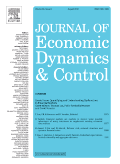
JOURNAL OF ECONOMIC DYNAMICS & CONTROL
Pioneering Research for Dynamic Systems and Control ExcellenceJOURNAL OF ECONOMIC DYNAMICS & CONTROL, published by Elsevier, is a distinguished scholarly journal that has established itself as a leading outlet in the fields of applied mathematics, control and optimization, and economics and econometrics since its inception in 1979. With its notable Q1 categorization in 2023 across these disciplines, this journal provides a platform for innovative research that propels theory and practice in dynamic systems and control processes. Researchers, professionals, and students can engage with cutting-edge studies that explore complex economic models and their real-world applications. Although the journal does not offer open access, it remains a vital resource for those aiming to stay informed of the latest advancements in economic dynamics and control methodologies. The journal’s commitment to high-quality research and its impressive standing—ranked in the top percentiles within Scopus categories—underscore its importance and influence within the academic community.
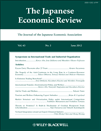
JAPANESE ECONOMIC REVIEW
Exploring the intersections of policy and economic theory.Japanese Economic Review, published by Springer Heidelberg, is a renowned academic journal that aims to advance the understanding of economic processes within the context of Japan and the Asia-Pacific region. With an ISSN of 1352-4739 and E-ISSN of 1468-5876, this journal features high-quality research articles that span a broad range of topics in economics and econometrics. Ranked in the Q2 category for Economics and Econometrics as of 2023, it holds a Scopus rank of #332 out of 716, placing it in the 53rd percentile among its peers. Although not Open Access, the journal invites contributions that provide insights and empirical analyses beneficial to both academics and practitioners. Emphasizing a deep understanding of economic dynamics, the Japanese Economic Review is essential reading for anyone interested in the implications of economic policies and trends, making it a significant platform for scholarly dialogue and research dissemination.

INTERNATIONAL ECONOMICS AND ECONOMIC POLICY
Unveiling the Trends that Drive Global EconomicsINTERNATIONAL ECONOMICS AND ECONOMIC POLICY, published by Springer Heidelberg, is a pivotal journal in the field of economics, focusing on both theoretical and empirical research that addresses pressing international economic issues. With an ISSN of 1612-4804 and an E-ISSN of 1612-4812, this journal has been a reliable source of insights since its inception and is poised for continuous growth, converging its themes from 2005 to 2024. Ranked in the Q2 category of Economics and Econometrics in 2023, it stands at a commendable 63rd percentile among similar journals, emphasizing its significance and impact in the academic community. Located in Heidelberg, Germany, the journal provides an access portal for researchers, professionals, and students to engage with cutting-edge economic analyses that inform policy and practice globally. By publishing original articles, reviews, and policy discussions, INTERNATIONAL ECONOMICS AND ECONOMIC POLICY plays a crucial role in shaping the discourse within the global economics landscape.

EKONOMICKY CASOPIS
Exploring the Frontiers of Economic ResearchEKONOMICKY CASOPIS is a distinguished journal published by the Institute of Economics Research SAS and the Institute of Forecasting CSPS SAS, offering a comprehensive platform for the dissemination of innovative research in the field of economics and econometrics. Since its inception in 1978, the journal has been committed to fostering scholarly discourse, showcasing empirical studies, theoretical advancements, and policy analyses that contribute to the understanding of economic phenomena. Although categorized in the Q4 quartile in 2023 and ranking in the lower percentiles within Scopus, EKONOMICKY CASOPIS remains a critical resource for researchers and practitioners seeking to engage with the economic challenges of our time. As the journal continues to evolve through 2024, it invites contributions that align with its objectives of enhancing economic insights and promoting academic discussion in Slovakia and beyond. For researchers looking to publish their work or expand their knowledge, EKONOMICKY CASOPIS serves as a vital resource in the expanding landscape of economic research.
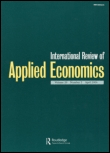
International Review of Applied Economics
Driving Policy Change with Empirical EvidenceInternational Review of Applied Economics is a leading journal dedicated to the dissemination of innovative research in the fields of economics and econometrics. Published by Routledge Journals, a renowned name in academic publishing under Taylor & Francis Ltd., this journal has established itself as a key resource for scholars, practitioners, and decision-makers. With an impressive Q2 ranking in the category of Economics and Econometrics, and positioned in the 70th percentile based on Scopus rankings, it provides a platform for high-quality, peer-reviewed articles that address contemporary economic issues. The journal aims to facilitate the understanding of applied economic theory and practice, and it accepts a diverse range of contributions including empirical studies, theoretical analyses, and methodological advancements. Operating from the United Kingdom, it has been a significant contributor to the academic dialogue since its inception in 1987, fostering knowledge exchange through rigorous scholarship. Researchers, professionals, and students alike will find valuable insights that inform policy-making and economic strategy in its pages.

Romanian Journal of Economic Forecasting
Unveiling trends, shaping economic understanding.Welcome to the Romanian Journal of Economic Forecasting, a prestigious publication dedicated to advancing the field of economics and econometrics since its inception in 2008. Published by the Institute of Economic Forecasting, this esteemed journal provides a platform for scholarly articles that contribute to the theoretical and practical understanding of economic trends and forecasting methods. With an impactful presence in the Q3 category of Economics, Econometrics, and Finance, it ranks well on Scopus within its field, holding position #130 out of 288 journals, placing it in the 55th percentile. The Romanian Journal of Economic Forecasting aims to bridge the gap between theory and practice, making it a crucial resource for researchers, professionals, and students eager to engage with contemporary economic issues. Though it operates under traditional accessibility, it encourages authors from diverse backgrounds to share their groundbreaking research, fostering a dynamic academic environment. Explore the rich insights offered by this journal and join a community dedicated to the evolution of economic thought.